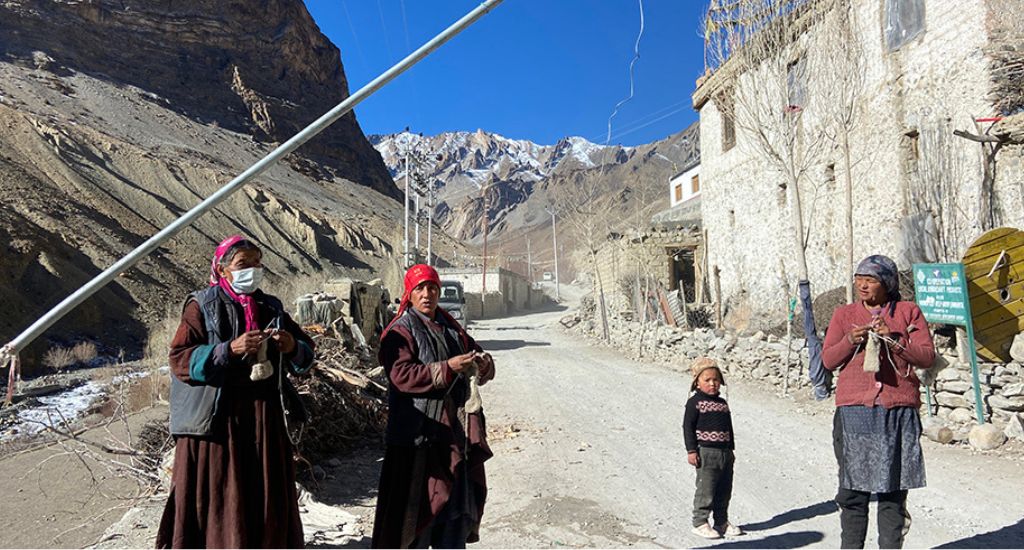
Ladakh’s Chipko: Mothers out on streets to save ‘sacred’ juniper trees
Women of Hanupatta high up in the Himalayas man checkpoints to stop felling and smuggling of juniper trees that are much in demand for their aroma.

Women of Hanupatta high up in the Himalayas man checkpoints to stop felling and smuggling of juniper trees that are much in demand for their aroma.
Little grows in the tiny village of Hanupatta high up in the Himalayas running through Ladakh but for the evergreen juniper trees that dot its otherwise cold, rocky and barren landscape.
It is the junipers that give Hanupatta an identity and its few residents a deep sense of pride.
Many consider the tree to be sacred and an essential part of religious rituals. Others are fascinated by its dainty twigs and sap with a very pleasant aroma. It is the favourite ingredient for the choicest perfume of many.
But then the junipers’ fame is also the source of growing concern, particularly for the women of the 17 households that make up Hanupatta.
As the demand for junipers has grown, so has its exploitation. People are plucking, cutting and carrying them away randomly, raising fears that the trees could vanish from the region soon if not conserved.

Alarmed that their famous juniper trees are under threat, women of Hanupatta have stepped up to protect them.
Under the banner of Hanupatta Ama Tsokpa (Hanupatta Mother Association), the women now patrol the streets, checking for illegal transportation of junipers.
Also Read | Ladakh’s lute maker gives ‘dranyen’ new lease of life
The women also stand vigil at the exit points of the village, rummaging through trunks of passing vehicles for any trace of their favourite tree.
The association was formed some 20 years ago with a view to preserving the village’s cultural heritage by focussing on local handicraft and promoting activities such as carpet weaving, jewellery making and hand knitting.
At times the group also organises religious feasts and receptions for visiting senior Buddhist Lamas.
For the past three years though, the mothers are busier, checking the over-exploitation of juniper trees.
“Juniper is about to disappear in our neighbouring village of Wanla, but we won’t let it happen here,” said Tsewang Dolma,67, the eldest of the ladies in the association.
Juniper trees – commonly called the Himalayan pencil or shukpa in Ladakh – are known to be robust and resilient and are among the very few trees that can endure the harsh climate, remaining evergreen in the cold desert.

But their regeneration is a cause for concern in view of global warming, overexploitation for religious and cultural purposes and habitat degradation.
Also Read | Once a ‘burden’, double-humped camel is a prized animal in Ladakh today
Its excessive use by locals is the greatest threat of all. Many ruthlessly cut the trees down for twigs that are then marketed outside, while others use it for incense sticks.
Considered a sacred plant, locals often use the twigs for decorating Lha-dho, the stupa structures at the entrance of every Buddhist village. The plant is also burnt as an incense to cleanse the house, its aromatic smoke treated as an offering to deities.
Its berries are also in demand for medicinal and nutritional benefits used mostly in the traditional Amchi system – an indigenous medical practice prevalent in the Himalayan region.
Women of Hanupatta see the situation as grave and so they have stepped out in a bid to save the juniper.
They patrol the exit roads and check the vehicles heading towards Leh. At any point of time during the day, there are three of them keeping vigil.

“Having a strong pungent aroma is the best way to detect a hidden juniper sack,” said Tsering Chuskit, 56.
The task though is not easy. Altercations often erupt as those caught furtively taking out twigs and berries often challenge the authority of the Hanupatta mothers.
Also Read | Modern Farming: Growing potatoes on Mars? Ask these Ladakhi women farmers
“There are many incidents of verbal arguments,” admitted Tsering Dolkar, 35, a teacher at the Hanupatta government primary school.
The women, however, are standing firm and refusing to lower their vigil. For that matter, they heighten their watch in the months when the demand for juniper is the highest.
“The demand is maximum during Losar (Ladakhi New Year) which mostly falls in December. It is then when every household uses it as incense during rituals,” pointed out Sonam Dolma, 50.
“And also, it is customary to replace old juniper twigs from Lha-dho with fresh branches on Losar,” she added.
The initiative of the women is bearing results and attracting appreciation.
In the three years they have worked with the local forest department, the mothers of Hanupatta have handed over five sacks of juniper that were being illegally transported.

The seizures so far could be seen as modest, but there is no way the effort of the mothers could be minimised.
“All conservation efforts might have been in vain unless the community came to the forefront. The mothers are undoubtedly doing a commendable job,” said Tsering Samphel, an official of the Khaltse forest department.
Thanks to the women of Hanupatta, there is increased awareness about protecting the juniper with calls for declaring it as the state tree.
“Considering its ecological, economic and cultural significance, declaration of the species as the state tree of the union territory of Ladakh will strengthen conservation efforts,” Padma Gurmet, chairperson of the state tree and flower committee, told Village Square.
Hopefully, the juniper will survive and remain the region’s jewel.
The lead image shows women guarding the entrance to Hanupatta village, to prevent junipers being smuggled out (Photo by Dawa Dolma)
Dawa Dolma is a freelance journalist based in Leh. She writes about climate change, communities, and culture of the Himalayas. She is a Rural Media Fellow 2022 at Youth Hub, Village Square.